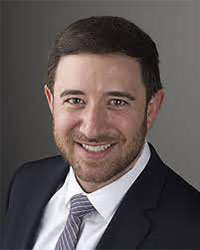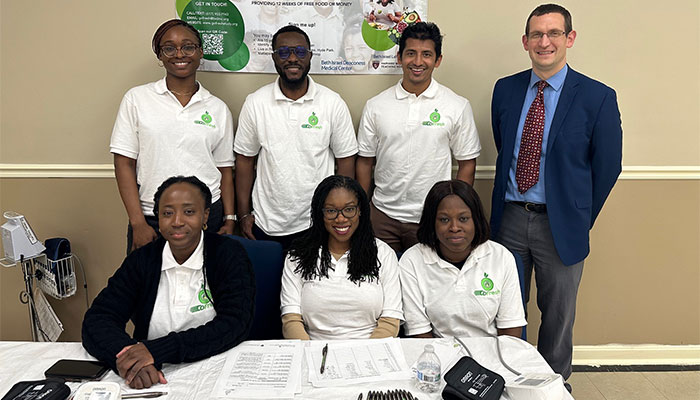BIDMC’s Complex Hypertension Clinic Offers First-Of-Its-Kind Procedure to Patients with Hard-To-Treat High Blood Pressure
Written by Jacqueline Mitchell
JANUARY 11, 2024
BIDMC’s Hypertension Center Is the Region’s Only American Heart Association-Certified Comprehensive Care Center

After her lifelong battle with an invisible adversary, Susan Mann and her physicians may finally have the upper hand against her treatment-resistant high blood pressure.
Mann was just eight years old when doctors at then-Beth Israel Hospital made the surprising diagnosis. In the 1960s, physicians didn’t have much to offer their young patient besides a prescription for sedatives and a recommendation for a low-sodium diet. “That didn’t help me much at all,” she recalls, “and from that point on, I’ve always been very restricted.”
Nearly half of American adults, or 120 million people, have high blood pressure. With many unaware of their hypertension or unable to access or take medications consistently, just one in four people with high blood pressure have it under control. For a subset of patients—like Sue Mann—standard hypertension medications prove intolerable and/or ineffective, leading to what’s known as treatment resistant hypertension. With blood pressure that remains dangerously elevated despite the patient’s use of three or more antihypertensive medications, including a diuretic, these individuals face an increased risk of heart disease, stroke and cardiovascular complications.
Mann—who remained a Beth Israel patient throughout her life—struggled to manage her blood pressure as she matured, despite her doctors’ care and her careful adherence to their recommendations. “Every decade, they would get me on something that worked for a while, and then it didn’t. I became this difficult patient to manage—not as a person, but my condition.”
But in spring of 2023, when Mann, now 71, had to add a sixth medication to her daily regimen to stabilize her hypertension, her cardiologist Anne B Reilly, MD, referred her to her colleague Anna Katherine Krawisz, MD, a sub-investigator on a clinical trial to evaluate a new approach to combating treatment-resistant hypertension.
Beyond Medication - Renal Denervation
Typically, the renal nerve helps the kidney keep blood pressure finely tuned to the body’s needs by signaling for the release of hormones that narrow blood vessels and retain salt and water as necessary. But in some patients, the renal nerve contributes to chronic hypertension, said Eric A. Secemsky, MD, Director of Vascular Intervention at BIDMC and Section head of Interventional Cardiology and Vascular Research at the Richard. A. and Susan F. Smith Center for Outcomes Research in Cardiology at BIDMC.
In a new procedure called renal denervation (RDN), pioneered by Secemsky at BIDMC, physicians permanently disrupt the nerves controlling the kidneys’ arteries, potentially bringing patients’ treatment resistant hypertension back under control.
"Our clinic has been at the forefront of this technology,” said Secemsky, who has so far treated six patients. Two catheter-based devices are now FDA-approved for use in renal denervation to treat uncontrolled hypertension. The minimally invasive devices are inserted through the groin and threaded through vessels until they reach the renal artery that feeds the kidneys. One device is a balloon-based treatment that is filled with hot water once it reaches its destination, disrupting the nerve by applying heat through the vessel wall. The second device disrupts the nerve using radiofrequency ablation, similar to a common procedure to eliminate cardiac arrhythmias.
An outpatient procedure, RDN lasts roughly 90 minutes. Patients undergo conscious sedation and are expected to go home the same day.
Both devices obtained FDA approval, in part based on the good outcomes of participants under the care of Secemsky, who is the site primary investigator. Trials have shown that patients can expect a seven to ten point drop in blood pressure, he reports. While that may not sound like a lot, “my mantra is every millimeter counts,” said Secemsky. “In some meta-analyses that look at blood pressure, we see that a five-point pressure reduction adds up to a ten percent relative reduction in the risk of cardiovascular events, so it doesn’t take much, as long as it’s persistently lowered over the long term, to make the difference.”
However, Secemsky adds that, anecdotally, individual patients have seen blood pressure drops as large as 25 points, while others’ have hardly budged. Those findings raise more questions about the new treatment option—are there more or different nerves the physicians could target to get better results? Is there a way to tell which patients might see better outcomes ahead of time? Secemsky and colleagues will get to the bottom of these questions as more people with intractable blood pressure seek treatment for it.
"And that’s the most important part to me—that we have a place for these patients to get dedicated care, because hypertension is often overlooked and undermanaged,” Secemsky said. “This device is novel and state-of-the art, but more importantly, having something to offer people with treatment resistant blood pressure represents one part of our opportunity to build one of the largest hypertension centers in New England.”
Comprehensive Care - In the Clinic and Beyond
Secemsky offers RDN through BIDMC’s Complex Hypertension Clinic, a multidisciplinary team of experts specifically assembled to manage and support patients like Mann who are unable to keep their blood pressure under control.
Launched by Clinical Director Jennifer L. Cluett, MD, and lead cardiologist Anna Krawisz, MD, in 2023, the Complex Hypertension Clinic operates together with BIDMC’s Hypertension Center at Healthcare Associates, and is the only hypertension center in New England to achieve certification by the American Heart Association as a Comprehensive Hypertension Center and one of only 14 nationwide. A certified hypertension specialist, Cluett became interested in managing patients’ blood pressure when she considered “its multi-specialty scope,” she said.
“Name someone who treats hypertension. It touches internal medicine, cardiology, nephrology, endocrinology, geriatrics, OBGYN, sleep medicine—and not just physicians, but nurse practitioners, nurses and pharmacists,” she said. “But because there's so many people that could treat it, no one was really at the helm.”
The Complex Hypertension Clinic typically receives referrals from primary care physicians or other specialists who have had challenges managing their patients’ blood pressure or noticed unusual features or symptoms, Cluett said. Maybe the patient is only 30, which is considered young to present with hypertension or perhaps they have tried multiple treatments already without success. Patients referred to the Clinic often have medical conditions unrelated to their hypertension that can complicate treatment, including using medications that may not mix well with the more common blood pressure medications.
Cluett said another major impetus for launching the Hypertension Center at Health Care Associates was to address the gap between the guideline recommendations for treating hypertension and the reality of what happens when a patient has elevated blood pressure.
“Part of the reason why 75 percent of patients’ blood pressure isn't well controlled in this country is because patients need to be seen and have medication adjustments as frequently as once a month, every month until their blood pressure is at goal,” she said. “That's just not happening in real life. There's no bandwidth for that, and it’s on both the patient and provider side.”
Cluett and colleagues developed a team approach that recruits clinical nurses, pharmacists and population health specialists to do some of this intensive patient follow-up by telehealth or through secure patient messaging. They also piloted and rolled out a remote blood pressure monitoring program that relies on patients to check their numbers at home and send them in to their care team.
The results were outstanding. In a pilot study of 150 people with high blood pressure, more than 80 percent brought their hypertension under control within six months. The program will soon be rolled out across Health Care Associates’ 40,000 patient practice.
Cluett, who notes that Lahey Hospital & Medical Center has a similar multidisciplinary team of hypertension experts led by Adam M. Segal, MD, chair of the Division of Nephrology and Hypertension, suggests the strategy could one day be applicable across BILH’s 1.3 million patients.
“We’ve been advocating for widespread in-home blood pressure monitoring because this is something that could be really impactful at the population level,” said the Hypertension Center’s Research Director, Stephen P. Juraschek, MD, PhD.
Cluett, Juraschek, and team have their eyes on another population, too—people without known high blood pressure. The team offers free blood pressure screenings to BIDMC’s community, where people feel comfortable, in places they were already going to be, such as a neighborhood church in Boston on a Sunday morning. They are running two clinical trials to evaluate whether delivering healthy groceries to people without hypertension who are living in parts of Boston with limited access to fresh foods can prevent them from developing high blood pressure in the first place.
The multipronged approach is making a difference. Among Health Care Associates’ patients, nearly 75 percent have their blood pressure under control, defined as 140/90 mmHg or lower—the complete inverse of the statistics for the United States in general.
“We've made a lot of great strides. We’re completely bucking the trend,” said Juraschek. “When I think about our 40,000 patients, those are real cardiac events being prevented, real lives being saved.”
On the Mend
Sue Mann sailed through the outpatient procedure the Tuesday after Thanksgiving 2023. Not two weeks later, she was feeling just fine, didn’t “even have a black and blue mark” at the site of the catheter.
Mann understood that the procedure would not completely cure her of high blood pressure. The physicians were clear that RDN could reduce her blood pressure enough to improve her hypertension symptoms by up to 30 percent.
By late December, Mann reported that her blood pressure had dropped enough for her doctors to lower her dose of clonidine, an antihypertensive with sedative side effects, from 0.6 mg to 0.1. “This is quite significant for me,” Mann said. “The goal is to be completely off the clonidine.”
Several members of Sue Mann’s family passed away suddenly and young, like her mom at 36, days before 8-year-old Sue received her own diagnosis. She can’t help but wonder if high blood pressure played a role. That’s one reason why Mann feels grateful to be alive in 2023.
“I’ve had this issue more than 60 years, and these bright young doctors finally came up with something to help,” she said. “So many of my relatives died young, none really lived long enough to find out whether they had this same issue as me. I don't take it for granted that I live in a time when this can be done.”

About Beth Israel Deaconess Medical Center
Beth Israel Deaconess Medical Center is a leading academic medical center, where extraordinary care is supported by high-quality education and research. BIDMC is a teaching affiliate of Harvard Medical School, and consistently ranks as a national leader among independent hospitals in National Institutes of Health funding. BIDMC is the official hospital of the Boston Red Sox.
Beth Israel Deaconess Medical Center is a part of Beth Israel Lahey Health, a health care system that brings together academic medical centers and teaching hospitals, community and specialty hospitals, more than 4,700 physicians and 39,000 employees in a shared mission to expand access to great care and advance the science and practice of medicine through groundbreaking research and education.
